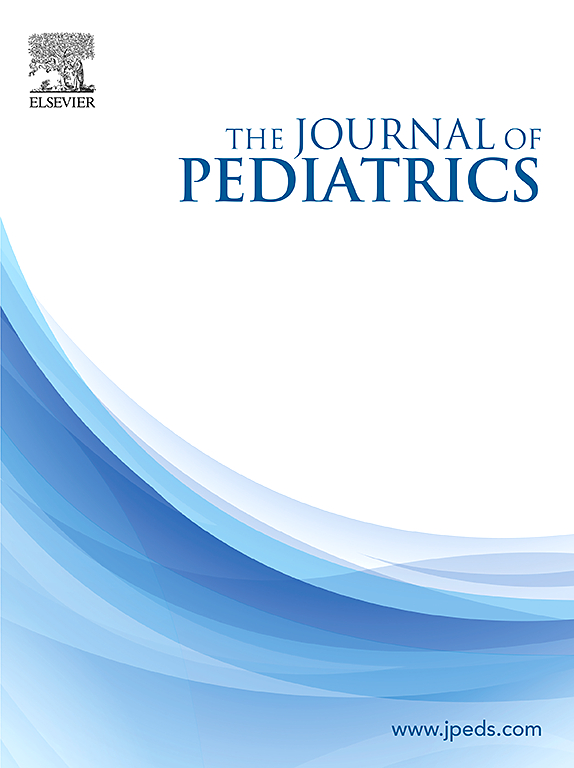胎儿脊髓脊膜膨出的产前修复对胃肠功能的影响。
IF 3.9
2区 医学
Q1 PEDIATRICS
引用次数: 0
摘要
目的:评估开放性神经管缺陷(ONTD)的产后、开放式胎儿和胎儿镜修复对肠功能的影响,并评估饮食调整和药物使用对肠功能正常的影响。研究设计:2011-2020年在我们的学术转诊胎儿中心进行回顾性队列研究。患者按手术路线分层(产后、开放产前或胎儿镜产前)。通过患者报告的布里斯托大便量表以及当前肠道管理药物使用的详细回顾来评估肠道功能。从电子病历中获得患者人口统计数据和临床相关结果。主要结果是在随访30个月时评估肠道功能。结果:共有150例胎儿ONTD患者在我院接受了修复。48例(32%)接受了产后修复,34例(23%)接受了开放式胎儿手术,68例(45%)接受了胎儿镜修复。86名患者(57%)在30个月时报告肠功能异常。两种手术方式在肠功能异常方面没有差异(产后35% vs开放产前26%,胎儿镜49%,p=0.08)。与产前手术相比,接受产后修复的患者更有可能需要口服方案来恢复正常的肠道功能(产后83% vs开放式产前59%,胎儿镜69%,p=0.046)。结论:无论采用何种手术方式治疗ONTD,肠道功能异常仍然是一个重要的发病率。与产后修复相比,ONTD的胎儿手术(开放或胎儿镜)可能导致相同的肠功能。本文章由计算机程序翻译,如有差异,请以英文原文为准。
Impact of Prenatal Repair for Fetal Myelomeningocele on Gastrointestinal Function
Objectives
To assess the impact of postnatal, open fetal, and fetoscopic repairs for open neural tube defects (ONTDs) on bowel function and to assess the use of diet modification and medication use to achieve regular bowel function.
Study design
A retrospective cohort study was performed from 2011 to 2020 at our academic referral fetal center. Patients were stratified by route of surgery (postnatal, open prenatal, or fetoscopic prenatal). Bowel function was assessed by patient reported Bristol stool scale as well as a detailed review of current medication usage for bowel management. Patient demographics and clinically relevant outcomes were obtained from electronic medical records. The primary outcome was bowel function assessed at 30-month follow up visit.
Results
A total of 150 patients with fetal ONTD underwent repair at our institution. Forty-eight (32%) underwent postnatal repair, 34 (23%) open fetal surgery, and 68 (45%) fetoscopic repair. Eighty-six patients (57%) reported abnormal bowel function at 30 months of life. No differences were noted in abnormal bowel function between surgical approaches (postnatal 35% vs open prenatal 26%, and fetoscopic 49%, P = .08). Patients who underwent postnatal repair were more likely to require oral regimens to achieve normal bowel function compared with either prenatal surgery approach (postnatal 83% vs open prenatal 59%, and fetoscopic 69%, P = .046).
Conclusion
Abnormal bowel function remains a significant morbidity regardless of surgical approach for ONTD. Fetal surgery (open or fetoscopic) for ONTD may result in equivalent bowel function when compared with postnatal repair.
求助全文
通过发布文献求助,成功后即可免费获取论文全文。
去求助
来源期刊

Journal of Pediatrics
医学-小儿科
CiteScore
6.00
自引率
2.00%
发文量
696
审稿时长
31 days
期刊介绍:
The Journal of Pediatrics is an international peer-reviewed journal that advances pediatric research and serves as a practical guide for pediatricians who manage health and diagnose and treat disorders in infants, children, and adolescents. The Journal publishes original work based on standards of excellence and expert review. The Journal seeks to publish high quality original articles that are immediately applicable to practice (basic science, translational research, evidence-based medicine), brief clinical and laboratory case reports, medical progress, expert commentary, grand rounds, insightful editorials, “classic” physical examinations, and novel insights into clinical and academic pediatric medicine related to every aspect of child health. Published monthly since 1932, The Journal of Pediatrics continues to promote the latest developments in pediatric medicine, child health, policy, and advocacy.
Topics covered in The Journal of Pediatrics include, but are not limited to:
General Pediatrics
Pediatric Subspecialties
Adolescent Medicine
Allergy and Immunology
Cardiology
Critical Care Medicine
Developmental-Behavioral Medicine
Endocrinology
Gastroenterology
Hematology-Oncology
Infectious Diseases
Neonatal-Perinatal Medicine
Nephrology
Neurology
Emergency Medicine
Pulmonology
Rheumatology
Genetics
Ethics
Health Service Research
Pediatric Hospitalist Medicine.
 求助内容:
求助内容: 应助结果提醒方式:
应助结果提醒方式:


